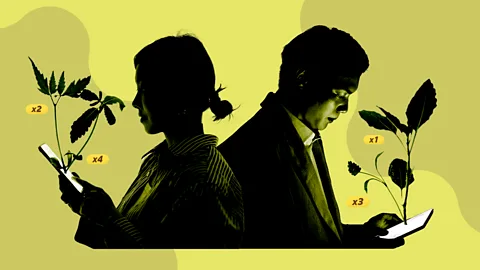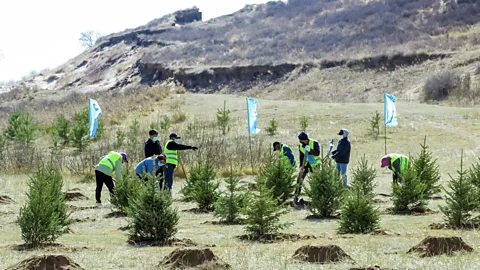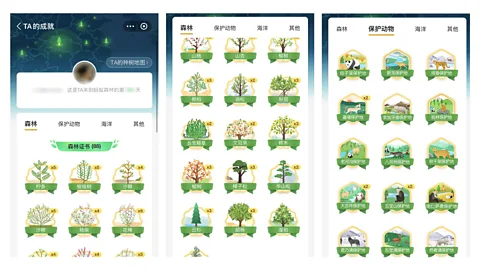 Serenity Strull/ BBC
Serenity Strull/ BBCAn acclaimed Chinese mobile app was designed to encourage green behaviour. Some of its users are gaming the system – paying others to help them rack up points and even buying devices that rock their phones to artificially boost their step count.
Every morning, the first thing 64-year-old retiree Li Yulan does when she wakes up is to plant some trees in Ant Forest.
It’s a popular carbon footprint-tracking mobile game in China. Players tend to digital trees – and by doing so, help plant real ones. “The game has enriched my life,” says Li, who used a pseudonym over security concerns.
Ant Forest has earned international praise for its business-friendly approach to helping the climate. Players earn points and credits for environmentally responsible activities in the real world, like biking to work or choosing sustainable products. These “green energy points” can be used to grow more digital trees, or claim an area in the game for conservation. Ant Forest is built-into Alipay, the world’s biggest online payment platform. The more you play, the more you use the Alipay app. Ideally, it’s a win-win.
The game’s green energy points are supposed to measure the climate benefits of players’ activities. Ant Group claims that every point you earn represents 1g of carbon emissions reduced by your behaviour, and the company boasts its users generated some 38 million “tonnes” of points. But the BBC has found examples where some players are generating points not through eco-friendly choices, but with hacks and work arounds. It means some of Ant Forest’s advantages could be overstated.
 Ant Group
Ant GroupSome users are so eager to boost their performance that they harness special apps that trick their phones into reporting climate-friendly behaviour. Some actually pay other players to rack up their in-game points and trees. As the game has grown in popularity, a black market has emerged, with individuals and groups profiting by selling energy points on social media and offering tips on how to cheat the system in massive online “co-planting” groups.
Even Li, who says Ant Forest encouraged her to be more environmentally conscious, admits to some unscrupulous gaming. Li says she uses three other phones to water trees for her one account, and even bought a device that swings her phone back and forth to make it seem like she’s walking more. “Usually, after shaking it for over two hours, I can get over 18,000 steps,” Li says.
She says cheating deviates from the point of the game, but she’s compelled to outrank other players. “I feel myself having become addicted,” Li says.
‘Vigilant against misuse’
Wang Xiaoying, head of the Ant Forest programme, says the points generated by users are intended to motivate players to embrace sustainability and are not counted towards Ant Group’s own carbon neutrality targets and metrics. However, he acknowledges the game faces issues with cheating.
“We remain vigilant against misuse of the platform, including any circumvention in the generation of ‘green energy points’,” Wang says. “Ant Forest has blocked 26,000 accounts that have violated terms of Ant Forest and has taken appropriate legal action where needed.” Wang says points have no material value, but a “small minority” of users make efforts to inflate them.
It hard to say exactly how many players are cheating. It’s common enough, however, that the BBC easily found examples of organised groups with hundreds of players gaming the system, despite Ant Forest’s efforts to promote integrity on the platform.
Then there’s the question of pollution stemming from the app itself. Running a game with 700 million players comes with enormous electricity costs. When the BBC asked if Ant Forest runs on renewable energy, Ant Group didn’t respond.
Over the past few years, there’s been optimism about the possibility of using “gamification” to promote sustainable living, and Ant Forest is seen as a major realisation of that strategy. However, cheating aside, researchers have already raised doubts over the game’s real world impact; from the longevity and suitability of the trees being planted, to whether gamification truly can be a successful strategy for long-term behavioural change.
The Hype Meter Test
A total of 700 million users means the game has significant potential. Ant Group says the game led to the planting of 548 million trees, and some evidence suggests Ant Forest pushes users towards greener habits. However, cheating problems and other serious criticisms undermine some of the game’s carbon-savings claims.
In Ant Forest, the fastest pathway to points is to increase your “green” consumption or payments on Alipay. This has led some experts to argue the real effect of Ant Forest is to get users hooked on the Alipay app, increasing consumption and giving people the false idea that planting trees can undo the consequences of modern life.
There’s also another officially-sanctioned method that has zero climate benefit – one the company is quieter about. Users can generate points by watching ads and aimlessly scrolling through Alipay’s shopping pages for “eco-friendly” products, even if they don’t make a purchase.
The pitfalls of tree-planting
Consumer behaviour aside, the points generated within Ant Forest are tied to a matching fund, which Ant Group says has contributed to the planting of at least 548 million trees and the establishment of 34 public conservation areas since the game launched in 2016.
Planting trees in China is nothing new in a country that has embraced the concept of creating new forests since the early 20th Century. Since 1978, the Chinese government has spearheaded a series of campaigns to combat desertification. Among them is the Three-North Shelterbelt Project (TNSP), which aims to mitigate natural disasters such as sandstorms and soil erosion by improving environmental ecology in northern China. More than 90% of Ant Group’s trees have been planted in areas of TNSP, the company says.
However, tree-planting and forestry projects like these have been subject to criticism. “A lot of politicians have made it their pet project because it’s not just about protecting nature – it’s about development,” says Annah Lake Zhu, assistant professor of environmental policy at Wageningen University in the Netherlands.
Wang says Ant Group works with a host of external partners to ensure the efficacy and viability of its afforestation projects, and to choose suitable trees and plants.
 Alibaba
AlibabaRegardless, Zhu says Ant Group’s forestry programme contributes to just a tiny fraction of China’s overall efforts. The real impact comes from the game’s potential to influence players’ daily lives.
“It’s more a way to supplement the larger work the state is doing,” Zhu says. “It’s about getting a population that isn’t familiar with [environmental issues] on board with it in an everyday type of way.”
Studies show that Ant Forest does encourage low-carbon activities among its players. Companies in other parts of the world have copied the game’s model, such as GForest, a platform by Philippines-based mobile wallet provider GCash. Still, even some researchers who celebrate the app say that factors like China’s culture could have a significant influence on Ant Forest’s effect on players, and it may be hard to replicate the game’s successes in other countries or contexts.
But to what extent is the game actually changing people’s environmental behaviours? For those who spoke to the BBC – many on the condition of anonymity due to security concerns – the answer is complicated.
Gaming the game
In Ant Forest, users can gain points by choosing 54 types of carbon-reducing “green behaviours”, such as selecting paperless billing, buying green products or recycling old clothes – but only when people are using Alipay’s platform and delivery networks. Ant Forest refers to its green energy points in “grammes”, or “g” for short. For example, riding an Alipay shared bike will generate 1.8g points per minute, paying for the subway is worth 52g per ride and buying train tickets online will earn you 136g points per transaction. In theory, each point represents 1g of reduced carbon dioxide emissions. The company makes frequent references to the number of “tonnes” of points generated by users as a measure of Ant Forest’s success.
Ant Group’s Wang says the green energy points are calculated using algorithms developed by a long list of external climate experts and scientific partners, including the Nature Conservancy and the China Beijing Green Exchange. The primary purpose of the points system is “to encourage sustained citizen engagement by making their contribution visible and trackable”, he says.
But these “green energy points” may not add up to pro-environmental behaviour in the real world. The BBC found evidence of a coordinated economy of cheaters.
 Ant Group
Ant GroupA variety of cheating opportunities are available for sale on Xianyu, an eBay-like platform run by Alibaba, the very same company that owns Ant Group. Xianyu sellers typically create a dozen accounts and generate large numbers of points by fabricating step counts and other tricks, according to Zhao, a long-time Ant Forest user with direct knowledge of various schemes used in the game, who asked to use a pseudonym.
Another player who asked to remain anonymous says that he bought a “monthly watering service” on Xianyu, where the seller visits his forest in the game and waters his trees, allowing him to accumulate more points. He says the service costs him 26 yuan (about £2.81, or $3.64) a month.
It’s also possible to buy tree certificates – which you get from the app by successfully planting a tree – according to three Xianyu sellers who declined to give their names. The sellers did not respond to queries about how much they earn from this practice, but the BBC found one shop selling certificates for 14 trees for 45 yuan (about £4.87, or $6.30). Another account selling such services has attracted over 12,000 orders.
Wang says that any attempt to abuse, misuse or profit from Ant Forest hurts all users and leads to material losses for Ant Group. It also violates the game’s terms of service. In 2023, for example, a player sued Ant Group after the company blocked his account for repeatedly paying and refunding his household bills to rack up points. The case was thrown out by a Chinese court. Wang says the company continues to monitor social platforms to discourage such behaviour.
“We welcome expert and public feedback, so together we can improve this collaborative mechanism,” Wang says.
A ‘clear contradiction’
Other players are manipulating Ant Forest’s “co-planting” feature, which lets users plant and care for digital trees together by creating a group, thus speeding up their achievements in the game.
One example is a group run by an organisation called Zhishanlin (Mandarin for “Forest of Supreme Goodness”). Founded in 2019, it calls itself China’s largest “voluntary co-planting organisation for public welfare” and has approximately 150,000 members. “It’s like an army for planting trees,” Zhao says, where a digital tree that normally takes a month to grow in the game can be spun up in just three days.
Hardcore Ant Forest players have been drawn to the efficiency of these groups. Zhishanlin has strict rules for membership and requires as much as 1,000 points a day to participate. How do users accumulate enough points to participate in them? For some, it seems, by cheating.
In a social media post by Zhishanlin, administrators offer tips for gaming the system, such as creating fake step counts via other apps or purchasing devices that swing your phone to simulate walking. They also suggest players create more accounts themselves to gain points for their main account. “What you need to do every day is switch accounts and water your main account one by one,” the post says.
According to Wang, Ant Group has no affiliation with groups like Zhishanlin and the company “will follow up with necessary legal actions”. He says the game has built-in mechanisms to detect cheating, and has identified 70 cheat-related “plugins” that players use to manipulate Ant Forest. It also discourages cheating by putting a cap on the awards players use to earn points, Wang adds, such as a limit on how many steps are counted towards the game, or the number of subway rides users can report.
A note from the editor
Ant Forest’s cheating problem raises doubts about an app that’s won coveted awards for its green benefits. As I worked on this story, however, I was reminded of how China can often take steps to address climate change on a breath-taking scale. For more, check out this story on China’s new “bullet train for power”, an ultra-high-voltage electricity grid to pipe renewable energy across the country.
In a social media post by Zhishanlin, administrators offer tips for gaming the system, such as creating fake step counts via other apps or purchasing devices that swing your phone to simulate walking. They also suggest players create more accounts themselves to gain points for their main account. “What you need to do every day is switch accounts and water your main account one by one,” the post says.
According to Wang, Ant Group has no affiliation with groups like Zhishanlin and the company “will follow up with necessary legal actions”.
Wang says the game has built-in mechanisms to detect cheating, and has identified 70 cheat-related “plugins” that players use to manipulate Ant Forest. It also discourages cheating by putting a cap on the awards players use to earn points, Wang adds, such as a limit on how many steps are counted towards the game, or the number of subway rides users can report.
Still, the numerous examples of cheating found by the BBC make it clear these efforts haven’t solved the problem. Wang says it’s challenging to prevent all instances of misuse on a platform of Ant Forest’s size.
Some players who cheat, however, say Ant Forest has a positive effect. Li, the retiree who uses three phones to boost her tree growing, says the game really has encouraged her to be more environmentally conscious.
“I walk and bike more now. The game’s incentives make walking feel more purposeful… now, I assess how many green points I can get wherever I go,” Li says. “I still take the bus and subway more and buy green products.”
Yet some critics say the rise of cheating not only raises questions over the game’s effectiveness in promoting behavioural change, but also highlights the inherent conflict between the project’s profit-driven incentives and environmental motivations.
 Ant Group
Ant GroupZeng Zhen, doctoral researcher in global development at the University of Helsinki in Finland, argued in a 2020 bulletin that because Ant Forest’s points system is exclusive to products and services from Alibaba, the game increases users’ dependence on the platform and creates a “clear contradiction” between its environmental goals and “real influence” on players.
Ant Forest “also delivers simplified information about complex environmental issues and creates the idea that consumption can be compensated with tree-planting or conservation activities”, she argued in the post. “Therefore, it actually hinders its users from fully understanding the environmental implications of their consumption behaviours.”
‘Just a game’
To what extent do cheaters compromise the integrity of the game? Qingyu Zhang, professor of management science at Shenzhen University in China, says that there will always be users who abuse gaming technologies, and that their impact depends on whether the majority of users are still playing Ant Forest as intended.
“My thinking is still about what percentage of people have the mindset of caring about the environment or changing their lifestyle. For Ant Forest, I believe the positive effect is still bigger than the negative,” Zhang says.
Some research has demonstrated the effectiveness of nudges related to Ant Forest’s green energy points. A 2023 study examined incentives on Eleme, a food delivery app run by Alibaba, Ant Group’s parent company. Eleme switched the default delivery option to “no cutlery” and rewarded users with Ant Forest points for accepting the change. Orders that skipped cutlery went up 648%.
However, Guojun He, an economics professor at the University of Hong Kong who co-authored the study, says the points weren’t the primary motivation for users. It was changing the default and making the no cutlery option convenient that had the biggest effect. “Theoretically, when you’re playing those games, you’re probably not making substantial changes in the long-run. We’re working with Alibaba to see if there are ways to encourage long-term habit formation in the future,” He says.
Mei, a former player in her 30s who asked to use a pseudonym, says that she used to be active on Ant Forest purely because she wanted to play the game and was attracted to the idea of tree-planting. But as she continued to play, she began to have doubts about the game’s impact and felt that it didn’t contribute to raising her environmental consciousness.
“In the beginning I was setting an alarm at 7am to collect energy points. But gradually I lost interest… I don’t even know if [Ant Group] really plants trees or not,” Mei says. Now, many of her friends have also stopped playing. “It’s just a game.”









